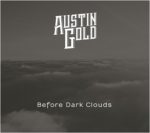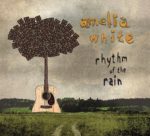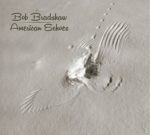 You want to know the way to listen to this album? Open road, windows down, volume up. It’s just a shame the old Capri shuddered to a halt decades ago. It was about the same vintage as the tunes and bands that inspired “Before Dark Clouds”. It’s released on the Jigsaw label, which specialises in recording to analogue tape as the first step in the production process and I have to admit the process works spectacularly well for Austin Gold. And now you’re going to ask, quite rightly, what type of music this is.
You want to know the way to listen to this album? Open road, windows down, volume up. It’s just a shame the old Capri shuddered to a halt decades ago. It was about the same vintage as the tunes and bands that inspired “Before Dark Clouds”. It’s released on the Jigsaw label, which specialises in recording to analogue tape as the first step in the production process and I have to admit the process works spectacularly well for Austin Gold. And now you’re going to ask, quite rightly, what type of music this is.
Well, it’s the kind of music that I heard a lot of in my teenage years. I’ll name the influences, you can work out my age. The influences that immediately spring to mind are bands that combined stunning rock guitar players with slightly more soulful Hammond players like Jon Lord and Vincent Crane. Combine that with classic rock vocal stylings hinting at Paul Rodgers and David Coverdale, riffs-a-plenty, strong melodies and the occasional flurry of twin lead guitar and you’ve pretty much got it covered. And let’s not forget the occasional power ballad to for a bit of contrast.
The album’s opener is a statement of intent, with a killer guitar riff, subtle hints of Hammond and a huge seventies rock vocal. The chorus is massive, but the real highlight is the middle sixteen which launches a guitar solo contrasted with Hammond swirls and flurries; it stands up on its own, but it evokes the mood of seventies rock perfectly.
All the bases are covered; “The Reason” is funky and energetic, the title song hints at the melody and dynamics of Boston, “Home Ain’t Home” suggests Dave Gilmour’s guitar tone and “See the Light” could be early eighties American AOR (remember that term kids) by the likes of Journey or Foreigner. I’m not suggesting that “Before Dark Clouds” is derivative; the band picks out various elements, combinations of instruments, tones, melodies and rhythms that hark back to that era in the early to mid-seventies when all sorts of styles were melding and meshing and cross-pollinating to create new genres.
Bottom line: this album is beautifully played and constructed and it’s a whole lot of fun.
“Before Dark Clouds” is out now on Jigsaw.
 No, there’s no sign of a cover of The Cascades’ 1962 hit here; it’s all very much contemporary Americana. Amelia White’s style is very distinctive, and this is emphasised by the spontaneous feel of “Rhythm of the Rain”, which was made in four days at a very turbulent time in Amelia’s life. When she growls ‘Don’t think too much, people’ at the beginning of the title song, you can take a literal interpretation or a sarcastic one. Either works, it just depends wahich song you’re listening to. It’s certainly never going to be described a bundle of laughs, with “Yuma” and “Sugar Baby” dealing with addiction and “Sinking Sun” staring into depression.
No, there’s no sign of a cover of The Cascades’ 1962 hit here; it’s all very much contemporary Americana. Amelia White’s style is very distinctive, and this is emphasised by the spontaneous feel of “Rhythm of the Rain”, which was made in four days at a very turbulent time in Amelia’s life. When she growls ‘Don’t think too much, people’ at the beginning of the title song, you can take a literal interpretation or a sarcastic one. Either works, it just depends wahich song you’re listening to. It’s certainly never going to be described a bundle of laughs, with “Yuma” and “Sugar Baby” dealing with addiction and “Sinking Sun” staring into depression.
The musical stylings are pretty diverse, ranging from the adult-oriented-rock feel of “Sinking Sun” and “True or Not” to the laid-back Crazy Horse feel of “Supernova”. The album has a more raw, rockier edge than last year’s “Home Sweet Hotel”; although “Sugar Baby” opens with a menacing, ”Deliverance”-style banjo and eventually moves through the gears to “Sticky Fingers”-era Stones. Then there’s the title song, with a backbeat, swampy texture, and a sense of oppression and foreboding contrasted with the folky string band styling of the album’s closer which is enhanced by some nice Hammond organ.
There’s one song that stands out, even on an album packed with powerful songs and performances, and it’s a co-write with Lorne Entress and Lori McKenna. The skittering rhythms of “Said It Like a King” make the song feel like it’s rushing uncontrollably towards an unpleasant revelation; I may be looking for examples of this everywhere at the moment, but this song does sound like it might have been partly inspired by the leader of the free world. It’s about bullying and pulls together vignettes featuring a bully on the school bus, a hellfire preacher and a general delivering unpalatable messages which are accepted because each one “Said it like a king”. It’s a very clever lyrical idea, but the kicker comes in the final verse. No spoilers, you have to listen for yourself.
“Rhythm of the Rain” is an intense experience; even the opening song “Little Cloud Over Little Rock”, peeping into the lives of smalltown Americans having their Friday night fling to a soundtrack of Merle Haggard and George Jones is underpinned by the quiet desperation of the line ‘his friends are coming to drink their unemployment down.’ Is the album downbeat? Yep. Fraught? Sure. Compelling? Utterly.
“Rhythm of the Rain” is released in the UK on White-Wolf Records on Friday October 27th.
Amelia will be touring the UK in November. Check out the dates here.
 It’s a musical ‘all you can eat’ buffet; a long-time outsider’s view of American popular music exploring some of the high protein meat dishes, but meandering through some of the more delicately flavoured and textured dishes as well. To add to the complexity, it’s a set of songs created by a self-taught musician who also happens to have studied for a popular music degree. Sophistication and raw rock power are both on the menu for this musical feast. On his previous album, “Whatever You Wanted”, Bob Bradshaw saved the best (in my opinion) for last, closing the album with the wonderful road song, “The Long Ride Home”. On “American Echoes”, he opens with the lovely, acutely-observed “Exotic Dancers Wanted”; all of smalltown America is there as he melds Tom Waits with Bob Seger’s “Mainstreet” to create a quiet classic of a song about desperation, drugs, booze and pole-dancing. He even throws in a W.B. Yeats reference.
It’s a musical ‘all you can eat’ buffet; a long-time outsider’s view of American popular music exploring some of the high protein meat dishes, but meandering through some of the more delicately flavoured and textured dishes as well. To add to the complexity, it’s a set of songs created by a self-taught musician who also happens to have studied for a popular music degree. Sophistication and raw rock power are both on the menu for this musical feast. On his previous album, “Whatever You Wanted”, Bob Bradshaw saved the best (in my opinion) for last, closing the album with the wonderful road song, “The Long Ride Home”. On “American Echoes”, he opens with the lovely, acutely-observed “Exotic Dancers Wanted”; all of smalltown America is there as he melds Tom Waits with Bob Seger’s “Mainstreet” to create a quiet classic of a song about desperation, drugs, booze and pole-dancing. He even throws in a W.B. Yeats reference.
To keep the culinary metaphor on the boil, “American Echoes” is a smorgasbord of musical stylings, or a pick ‘n’ mix if prosaic is your preference. It ranges all the way from the out and out rocker “Weight of the World”, with its huge riff, two guitars and The Who stylings to the acoustic ballad “Stella” with a Chris Izaak guitar sound and a vocal that’s a dead ringer for Elvis Costello in lower-register ballad mode.
There’s a bit of lyrical invention as well, to match the musical melange. “My Double and I” is a modern take on the Jekyll and Hyde theme matched up with a laid-back New Orleans jazz groove (with a nod towards Steely Dan’s “East St Louis Toodle-oo”), while “Working on My Protest Song” combines the kind of rhythms Paul Simon discovered in Africa with a mildly sarcastic dig at musicians who opportunistically appropriate protest movements for their ends. And the list goes on.
The bottom line is that Bob Bradshaw has produced another very fine album indeed. “American Echoes” is packed with great lyrical and musical ideas and gets better with repeated plays.
“American Echoes” is released in the on UK Fluke Records on Friday October 20.
 It’s six years since the release of her debut album, but Ciara Sidine hasn’t wasted that time; on the evidence of her second album “Unbroken Line”, she’s been constructing a fine bunch of songs that tackle contemporary issues with a deftness and delicacy of touch that evokes some of the great popular songwriters of our time. She’s not just an average singer, she has a fabulous voice that will melt the hardest of hearts, going all the way from delicate (almost fragile) to the bluesy raunch and double entendre of “Lemme Drive Your Train”.
It’s six years since the release of her debut album, but Ciara Sidine hasn’t wasted that time; on the evidence of her second album “Unbroken Line”, she’s been constructing a fine bunch of songs that tackle contemporary issues with a deftness and delicacy of touch that evokes some of the great popular songwriters of our time. She’s not just an average singer, she has a fabulous voice that will melt the hardest of hearts, going all the way from delicate (almost fragile) to the bluesy raunch and double entendre of “Lemme Drive Your Train”.
The opener, “Finest Flower”, sets the tone for the album with its haunting combination of melancholy pedal steel and upright creating the setting for a song tackling the iniquities of the Magdalene Laundries. It also shows Ciara’s willingness to experiment, using some grungy ambient sounds in the leadup to the guitar solo. Definitely no one-trick ponies here. The songs are strong and varied, the arrangements work perfectly for the subject matter, but the real clincher is Ciara’s voice. Her range is impressive and she makes the most of it. The laconic shuffle of “2 Hard 2 Get 2 Heaven” features the husky lower end, while the fatalistic acoustic piece “Woman of Constant Sorrow” features a high, keening vocal before building up to a menacing slide solo.
The band moves effortlessly between styles from the slow jazzy country feel of “Watching the Dark” to the gospel rockabilly of “Wooden Bridge”, hinting at the vocal stylings of Patsy Cline and Imelda May respectively. “Let the Rain Fall” references the Stax sound, particularly the clipped Steve Cropper guitar sounds and “Take Me with You”, featuring some particularly lovely harmonies, could have found a home on any of the first four Jackson Browne albums.
There are plenty of things to admire about this album; the songs, the settings, the individual playing and of course the superb vocals. The subtlety and gentleness of the stylings allows Ciara to push home some uncomfortable messages without introducing any harsh corners and in that respect, it’s a very nuanced and sophisticated piece of work.
“Unbroken Line” is released on Friday October 6th.


